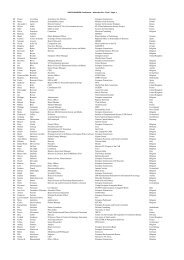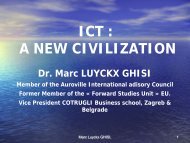ICT and sustainable growth Speech for Maria Da ... - PARADISO
ICT and sustainable growth Speech for Maria Da ... - PARADISO
ICT and sustainable growth Speech for Maria Da ... - PARADISO
Create successful ePaper yourself
Turn your PDF publications into a flip-book with our unique Google optimized e-Paper software.
<strong>ICT</strong> <strong>and</strong> <strong>sustainable</strong> <strong>growth</strong><br />
<strong>Speech</strong> <strong>for</strong> <strong>Maria</strong> <strong>Da</strong> Graca Carvalho<br />
Introduction<br />
Dear Members of Parliament,<br />
President of European Parliament,<br />
Commissioner Reding,<br />
Secretary General ITU<br />
Ladies <strong>and</strong> Gentlemen:<br />
• I would like to thank the organizers <strong>for</strong> the invitation to<br />
the Bureau of European Policy Advisers of the<br />
Commission to be here today.<br />
• The role of <strong>ICT</strong> in boosting economic <strong>growth</strong> is today<br />
well known. <strong>ICT</strong> has fostered the restructuring of markets<br />
<strong>and</strong> changed the ways we do business, <strong>and</strong> continues to<br />
offer a great opportunity <strong>for</strong> innovation.<br />
• We need to invest in <strong>ICT</strong> as one of the main pillars to<br />
foster <strong>growth</strong> <strong>and</strong> create jobs, especially in the context of<br />
the dramatic economic downturn that the world economy<br />
is facing.<br />
• But this conference is not just about <strong>growth</strong> but also<br />
about sustainability. And if the role of <strong>ICT</strong> in fostering<br />
1
the <strong>growth</strong> is rather obvious, much more can be said<br />
about sustainability. <strong>ICT</strong> can play a crucial role in the<br />
making of a more <strong>sustainable</strong> world.<br />
• Such a role is not new. <strong>ICT</strong> had a major impact not only<br />
on the <strong>growth</strong> of wealth but also on its distribution.<br />
• The <strong>ICT</strong> revolution is fundamentally distributed in<br />
nature. It allowed an increasing share of individuals <strong>and</strong><br />
organizations to play an active role in the economic,<br />
political <strong>and</strong> social life.<br />
• Such a trend towards distributed intelligence <strong>and</strong> power<br />
will not just continue but will also change in nature. As<br />
many have argued, from the in<strong>for</strong>mation world, the <strong>ICT</strong><br />
revolution will move "outside" to be increasingly<br />
embedded in our reality. And this is already happening.<br />
• We will increasingly leave in an "intelligent ambient" in<br />
which humans will be surrounded by intelligent devices<br />
embedded in everyday objects <strong>for</strong> the health <strong>and</strong> com<strong>for</strong>t<br />
of human society.<br />
• These <strong>ICT</strong> enhanced realities give us the possibility to<br />
address today's global challenges in new ways.<br />
Challenges that, today more than ever, are at the same<br />
time about <strong>growth</strong> <strong>and</strong> sustainability.<br />
• Let me start with the major challenges of our century <strong>and</strong><br />
how <strong>ICT</strong> might contribute to address them.<br />
2
Global challenges <strong>and</strong> the role of <strong>ICT</strong><br />
Health <strong>and</strong> ageing society<br />
• A first challenge is about the ageing of our societies <strong>and</strong><br />
how this impacts not just on our capacity to grow, but<br />
also on our health <strong>and</strong> social protection systems.<br />
• Thanks to sixty years of peace, advancement on research,<br />
medical progress <strong>and</strong> better living conditions, a growing<br />
proportion of people are now enjoying longer <strong>and</strong> more<br />
active retirement.<br />
• But ageing also poses a series of social risks such as oldage<br />
dependency <strong>and</strong> loneliness, the need <strong>for</strong> in<strong>for</strong>mal<br />
care, <strong>and</strong> poverty particularly <strong>for</strong> those exposed to low<br />
pensions as a result of incomplete careers.<br />
• But thanks to <strong>ICT</strong> we can improve the life of older people<br />
at home, in the workplace <strong>and</strong> in society in general; allow<br />
them to stay active <strong>for</strong> longer <strong>and</strong> leave independently.<br />
• And <strong>ICT</strong> can also dramatically improve our capacity to<br />
deliver home care services in health, with a reduction in<br />
hospital stays, reduced costs <strong>and</strong> an increased quality of<br />
the service.<br />
3
Poverty <strong>and</strong> social exclusion<br />
• A second challenge is about poverty <strong>and</strong> social exclusion.<br />
• Only in Europe 78 million Europeans are at risk of<br />
poverty. Poverty strikes in particular the unemployed, the<br />
disabled <strong>and</strong> the elderly; women are disproportionately at<br />
risk. Even employment is not a guarantee against<br />
poverty: in-work poverty is on the increase, with some<br />
8% of employed people at risk of poverty.<br />
• There are barriers preventing or discouraging certain<br />
groups from gaining full access to employment, training,<br />
education, housing <strong>and</strong> health-care. Of course such an<br />
issue requires policies <strong>and</strong> actions that go far beyond<br />
<strong>ICT</strong>, ranging from labour market integration to investing<br />
in knowledge <strong>and</strong> life-long learning.<br />
• But <strong>ICT</strong> can help here. On the other h<strong>and</strong>, <strong>for</strong> many<br />
people at risk of exclusion due to physical <strong>and</strong> cognitive<br />
disabilities, <strong>ICT</strong> offers essential tools <strong>for</strong> overcoming<br />
barriers to social <strong>and</strong> economic integration.<br />
• <strong>ICT</strong> also plays a fundamental role in the developing<br />
world to bring in<strong>for</strong>mation, education, health to people in<br />
remote places.<br />
4
Climate change<br />
• Last but not least, a third major challenge is Climate<br />
Change <strong>and</strong> the consequent need to move towards a<br />
greater energy efficiency <strong>and</strong> role <strong>for</strong> renewable <strong>for</strong>ms of<br />
energy.<br />
• Such a move has far reaching environmental, but also<br />
social <strong>and</strong> economic implications. Renewable energies<br />
are everywhere. This implies that there will not just be<br />
few locations where energy is produced <strong>and</strong> stored, but<br />
there will be also an increasing number of distributed<br />
energy power plants.<br />
• But this also means that energy will become an<br />
opportunity <strong>for</strong> many to play an active role in its<br />
production <strong>and</strong> benefit from its value. Distributed energy<br />
means distributed wealth.<br />
• And here <strong>ICT</strong> will play a fundamental role. Through <strong>ICT</strong><br />
<strong>and</strong> grid technologies, an increasing number of actors<br />
will be able to produce renewable energy locally <strong>and</strong> use<br />
it off-grid <strong>for</strong> their own electricity needs.<br />
• But <strong>ICT</strong> can also increase the efficiency of our energy<br />
consumption. <strong>ICT</strong> will assist us in organizing our cities,<br />
working places in a complete different way with the<br />
objective to achieve a low carbon society.<br />
• Furthermore, <strong>ICT</strong> is crucial <strong>for</strong> the energy efficiency in<br />
buildings, in industry <strong>and</strong> in the transport sector.<br />
5
Critical issues<br />
• But we have to bear in mind that <strong>ICT</strong> is a tool. And like<br />
any tool, they can be used in positive <strong>and</strong> negative ways.<br />
Only if we look also at the critical aspects of <strong>ICT</strong> we can<br />
better underst<strong>and</strong> how they can be used to address major<br />
challenges. I would briefly go through three of them.<br />
1. <strong>ICT</strong> as part of the problem<br />
• A first issue is that the more we move towards<br />
in<strong>for</strong>mation <strong>and</strong> knowledge based economy <strong>and</strong> society,<br />
the more those that do not have access to in<strong>for</strong>mation <strong>and</strong><br />
knowledge will suffer from poverty <strong>and</strong> social exclusion.<br />
• For this reason I believe that, besides policies to foster<br />
technological development, we have to pay an increasing<br />
attention to those that ensure diffusion <strong>and</strong> access to<br />
technology.<br />
2. The illusion of control<br />
• A second issue is that having more in<strong>for</strong>mation does not<br />
mean necessarily to be more in<strong>for</strong>med. In<strong>for</strong>mation<br />
overload is one aspect but not the only one. Yet our<br />
increased access to in<strong>for</strong>mation can also give us the<br />
illusion to be more in<strong>for</strong>med <strong>and</strong> to be able to control the<br />
situation more than we actually do.<br />
• For this reason I believe that, besides having more<br />
in<strong>for</strong>mation, we need to think about new ways to ensure<br />
the quality <strong>and</strong> reliability of in<strong>for</strong>mation.<br />
6
3. All becoming big brothers<br />
• A third <strong>and</strong> last issue that I would like to refer is related<br />
to privacy <strong>and</strong> ethics. The risk of loosing our privacy<br />
caused by <strong>ICT</strong> has been already outlined by many. But I<br />
think that the more <strong>ICT</strong> will be embedded in our daily<br />
life, the more this problem may exacerbate.<br />
• The same concern goes <strong>for</strong> ethics. The capacity of <strong>ICT</strong><br />
together with other technologies to control, extend <strong>and</strong><br />
model human life poses a series of ethical issues on the<br />
obvious side effects of such a possibility.<br />
• In this sense, I believe that we should take in due<br />
consideration, the ethical implications of our <strong>ICT</strong><br />
policies.<br />
Conclusions<br />
• To conclude, I would like to stress that <strong>ICT</strong> are tools <strong>and</strong><br />
not ends. As such they need to serve a purpose which<br />
today is <strong>and</strong> should be broader than the simple <strong>growth</strong> of<br />
our economies. They should assist us in the process of<br />
building a healthier, cleaner society, with more social<br />
justice <strong>and</strong> where people feel happy.<br />
Thanks.<br />
1300 words<br />
7






